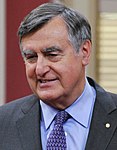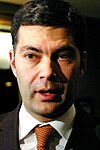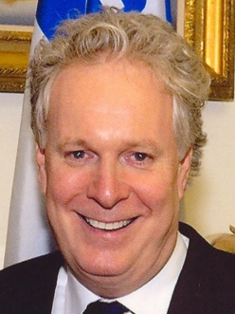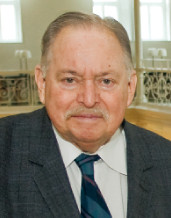| |||||||||||||||||||||||||||||||||||||||||||||
125 seats in the 36th National Assembly of Quebec 63 seats were needed for a majority | |||||||||||||||||||||||||||||||||||||||||||||
|---|---|---|---|---|---|---|---|---|---|---|---|---|---|---|---|---|---|---|---|---|---|---|---|---|---|---|---|---|---|---|---|---|---|---|---|---|---|---|---|---|---|---|---|---|---|
| Turnout | 78.32% ( | ||||||||||||||||||||||||||||||||||||||||||||
| |||||||||||||||||||||||||||||||||||||||||||||
 Popular vote by riding. As this is an FPTP election, seat totals are not determined by popular vote, but instead via results by each riding. Click the map for more details. | |||||||||||||||||||||||||||||||||||||||||||||
| |||||||||||||||||||||||||||||||||||||||||||||
The Quebec general election of 1998 was held on November 30, 1998, to elect members of the National Assembly of the Province of Quebec, Canada. The incumbent Parti Québécois, led by Premier Lucien Bouchard, won re-election, defeating the Quebec Liberal Party, led by Jean Charest.

The National Assembly of Quebec is the legislative body of the province of Quebec in Canada. Legislators are called MNAs. The Queen in Right of Quebec, represented by the Lieutenant Governor of Quebec and the National Assembly compose the Legislature of Quebec, which operates in a fashion similar to those of other Westminster-style parliamentary systems.
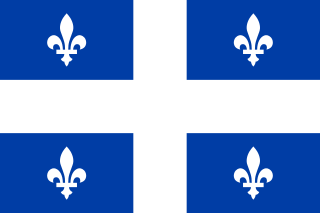
Quebec is one of the thirteen provinces and territories of Canada. It is bordered to the west by the province of Ontario and the bodies of water James Bay and Hudson Bay; to the north by Hudson Strait and Ungava Bay; to the east by the Gulf of Saint Lawrence and the province of Newfoundland and Labrador; and to the south by the province of New Brunswick and the U.S. states of Maine, New Hampshire, Vermont, and New York. It also shares maritime borders with Nunavut, Prince Edward Island, and Nova Scotia. Quebec is Canada's largest province by area and its second-largest administrative division; only the territory of Nunavut is larger. It is historically and politically considered to be part of Central Canada.

The Parti Québécois is a sovereignist and social democratic provincial political party in Quebec, Canada. The PQ advocates national sovereignty for Quebec involving independence of the province of Quebec from Canada and establishing a sovereign state. The PQ has also promoted the possibility of maintaining a loose political and economic sovereignty-association between Quebec and Canada. The party traditionally has support from the labour movement, but unlike most other social democratic parties, its ties with organized labour are informal. Members and supporters of the PQ are called "péquistes", a French word derived from the pronunciation of the party's initials.
Contents
After the narrow defeat of the PQ's proposal for political independence for Quebec in an economic union with the rest of Canada in the 1995 Quebec referendum, PQ leader Jacques Parizeau resigned. Bouchard left federal politics, where he was leader of the Bloc Québécois in the House of Commons of Canada, to lead the Parti Québécois and become premier.

Jacques Parizeau was a French-Canadian economist and politician who was a noted Quebec sovereigntist and the 26th Premier of the Canadian province of Quebec from September 26, 1994, to January 29, 1996.

The Bloc Québécois (BQ) is a federal political party in Canada devoted to Quebec nationalism and the promotion of Quebec sovereignty. The Bloc was formed by Members of Parliament who defected from the federal Progressive Conservative Party and Liberal Party during the collapse of the Meech Lake Accord. Founder Lucien Bouchard was a cabinet minister in the federal Progressive Conservative government of Brian Mulroney.

The House of Commons of Canada is a component of the Parliament of Canada, along with the Sovereign and the Senate. The House of Commons currently meets in a temporary Commons chamber in the West Block of the parliament buildings on Parliament Hill in Ottawa, while the Centre Block, which houses the traditional Commons chamber, undergoes a ten-year renovation.
Jean Charest had also left federal politics, where he had been leader of the Progressive Conservative Party of Canada. Charest was initially seen as a bad fit for the Quebec Liberal Party, and for provincial politics. He later overcame this perception.

The Progressive Conservative Party of Canada (PC) was a federal political party in Canada.
In terms of the number of seats won by each of the two parties, the result was almost identical to the previous 1994 general election. However, this time the Liberals won a slightly larger percentage of the popular vote, but nonetheless far fewer seats.
Mario Dumont, leader of the Action démocratique du Québec, repeated his success in winning his own seat, as he had done in the 1994 general election. However, his party also repeated its failure to elect any other member apart from its leader.

Mario Dumont is a television personality and former politician in Quebec, Canada. He was a Member of the National Assembly of Quebec (MNA), and the leader of the Action démocratique du Québec (ADQ), from 1994 to 2009. After the 2007 Quebec election, Dumont obtained the post of Leader of the Opposition in the National Assembly.

The Action démocratique du Québec, commonly referred to as the ADQ was a right-wing populist and conservative provincial political party in Quebec, Canada. On the sovereignty question, it defined itself as autonomist, and had support from nationalists and federalists. Its members were referred to as adéquistes, a name derived from the French pronunciation of the initials 'ADQ'.
